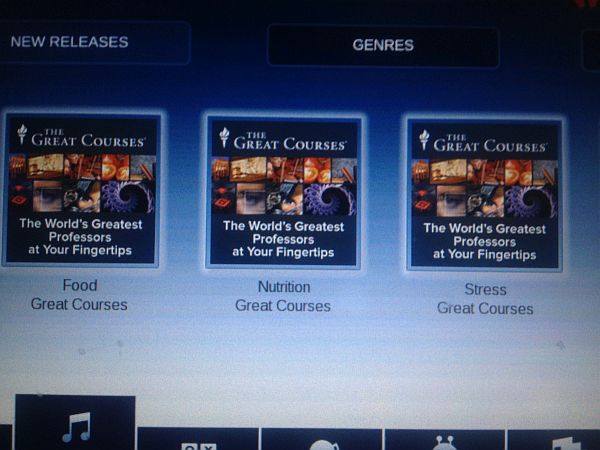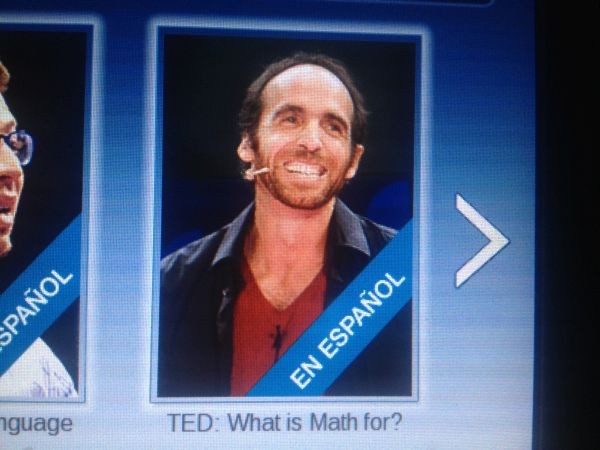
At the end of an overnight flight from San Francisco to New York is hardly the ideal time to play “I Spy Mathematics” on a packed airplane. We were all grumpy and groggy from four scant hours of sleep. It seemed that nobody had watched any films en route and, like most of the other passengers, I didn’t have headphones or earplugs to hand.
Clearly there was no point in scanning the entertainment offerings with just 15 minutes to landing. But then I remembered spotting an ad on screen for The Great Courses as I’d settled into my seat in San Francisco. Was it possible that I’d blown a chance to watch Art Benjamin, David Bressoud, Judith Grabiner, David Kung, James Sellers or Mike Starbird in action? I decided to try to find out.
It wasn’t easy to locate The Great Courses; they weren’t listed under Drama, Comedy, or Documentaries, or anywhere else that made sense. When I finally did find them—under an audio menu—I was disappointed to discover only a small and decidedly non-mathematical selection (on Food, Nutrition and Stress) on offer.

But then, cruising a different menu out of sheer boredom, I spotted a short list of TED talks. I was down to 13 minutes, as shown below, and doubted that I could build a computer or learn a language in that amount of time, despite being a committed life long learner. But maybe I could finally learn the answer to the question “What Is Math For?”.

I clicked on this option excitedly. Was it going to explain why the giant plane we’d just flown 4000 km on had stayed up in the air the whole time? (Delta is a real stickler on this point.) The person sitting beside me needed to wake up and pay attention. I considered shaking her back to reality with reassuring comments like, “We’re not dead yet, and this short video on maths will explain why” but thought the better of it, and left her to her slumbers.

“Mathematician Eduardo Sáenz de Cabezón answers the questions What is math good for? With humor and charm, he shows the beauty of math as the backbone of science” promised the next screen.
It claimed that the video was 11 minutes long, and it seemed I now had just 12 minutes to landing time. Even better, the video was in Spanish, and had English subtitles. With nothing left to lose, I settled down to watch silently, having no particular expectations.
It started off like a standard standup comedy routine, immediately delving into that awkward social situation for mathematicians where we reveal our profession and the response is either “I was always terrible at maths” or “what is mathematics for?” Within two minutes, the speaker had the audience in stitches, having brushed aside the practical “bridges and computers” justifications for mathematics. But he’d also slipped in a mention of Hardy, which certainly got my attention.
Soon he’d pointed out that a piece of paper folded 50 times would basically stretch from the earth to the sun. Then he was on to sphere packing and space filling, highlighting recent breakthroughs by American mathematician Tom Hales and Irish physicists Dennis Weaire and Robert Phelan, contrasting the “obviously” true with what we have really proved to be 100% true. It was a masterful relaxed performance, and the large general audience went along with him every step of the way, laughing and learning in equal measure.
Sáenz de Cabezón, I later discovered, has a PhD on “Combinatorial Koszul Homology: Computations and Applications” and teaches and researches at Universidad de La Rioja, Logroño, in Spain. He’s on Twitter, where it turns out I’ve been following him without realising that he had a video with over a million online views.
The official (American English) title of his TEDx talk is “Math Is Forever” which ties in with the presenter’s central message that “theorems, not diamonds, are forever.”
It’s not just Delta who are making such high-brow videos available to their passengers, Jet Blue and Virgin are too. However, pending further investigation, I have no evidence that either of those airlines’ offerings include any mathematical content, so I’m sticking with my claim that given any Delta (flight), there exists Epsilon (mathematics to view), such that the overall effect is enjoyable and enlightening.
Does Epsilon depend on Delta? In other words, can Epsilon maths be found no matter how short the Delta flight is? Perhaps. Epsilon is certainly small, though not infinitesimal here. (In the great scheme of things, the observed case may have been an essential singularity.)
I do know my limits, and if all else fails and Epsilon mathematics can’t be found on a particular flight, there may well be Epsilons in the Erdős sense on board.
Watch Eduardo’s talk below
